When it came to publishing the paperback version of my debut novel, IngramSpark seemed the obvious choice: it was a big player, with credibility in the industry and a massive distribution network. It had been recommended to me by authors and academics; and its website was brimming with helpful tools and tutorials about virtually every aspect of the publishing process. Continue reading
Category Archives: my publications
Unboxing that first novel!
All day I had waited for that first delivery from IngramSpark. I had skipped my daily walk. Five o’clock, I thought—he’s not coming now. Just as I laced up my runners for a belated stroll, I heard a low rumble in the street and looked down the driveway. A massive delivery truck pulled up; a stocky guy leapt out, opened the tailgate, lifted out a cardboard box and started labouring up the driveway and the 20-something steps from the carport up to my particular ivory tower…
“Boy, what a climb,” he sighed. “That was my last job for the day.” “Yes, and it’s the first box of my first novel,” I blurted out like an overexcited idiot. He looked at me strangely, handed me a stylus. I signed on a chunky electronic gadget that looked like a 1980s mobile phone, callously wishing he’d hurry back to his truck so I could open this box.
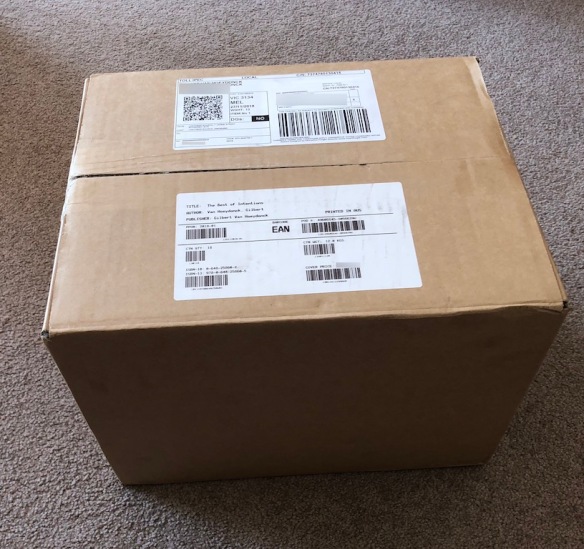
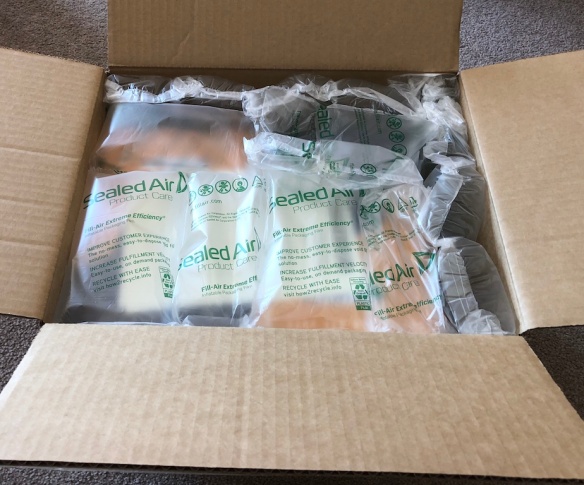
I happened to be home alone that afternoon, except for the cat of course, but Jebedie Paw Paw’s interests tend to be culinary rather than literary and anyway, he had sought refuge in the furthest bedroom at the first sign of a man (= tradie = infernal noise = feline doom) approaching. So I grabbed my iPhone to document the unfolding of this milestone.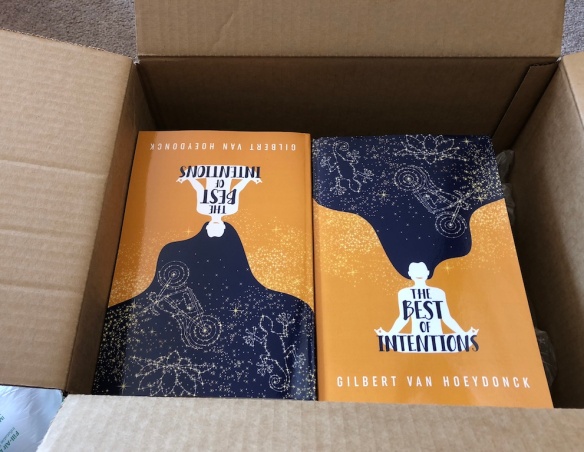 I loved the warm colours of the cover (thank you Dane at Ebook Launch).
I loved the warm colours of the cover (thank you Dane at Ebook Launch).
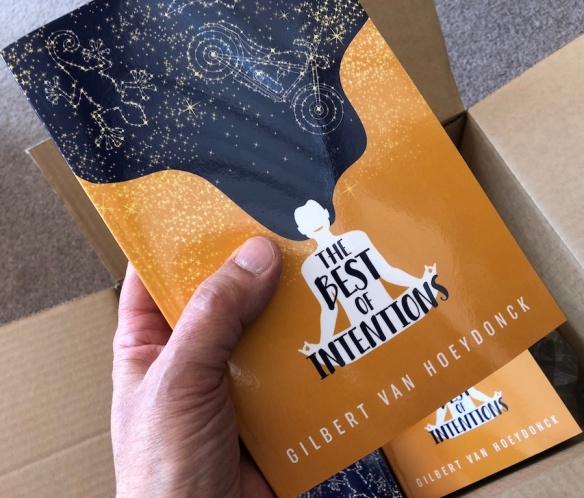 Then the joy of holding your book for the first time. Pressing that Publish button on Amazon and Smashwords had been a thrill, but not nearly as satisfying as feeling the weight of your book. The end point of the writer’s creative process. The transition from a mental construct to a physical product. The moment also where it can be shared with readers for the next part of the journey.
Then the joy of holding your book for the first time. Pressing that Publish button on Amazon and Smashwords had been a thrill, but not nearly as satisfying as feeling the weight of your book. The end point of the writer’s creative process. The transition from a mental construct to a physical product. The moment also where it can be shared with readers for the next part of the journey.
I could feel I had my stupid happy grin on my face, the one from ear to ear.
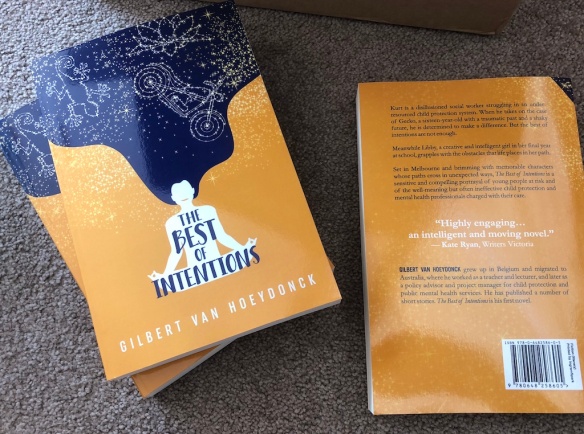
Then there’s the panicky little voice inside your head that reminds you to check everything. Title, author name, yep, all there. Nice print quality inside, no printing or binding errors, just this thing that looks like a Real Book.
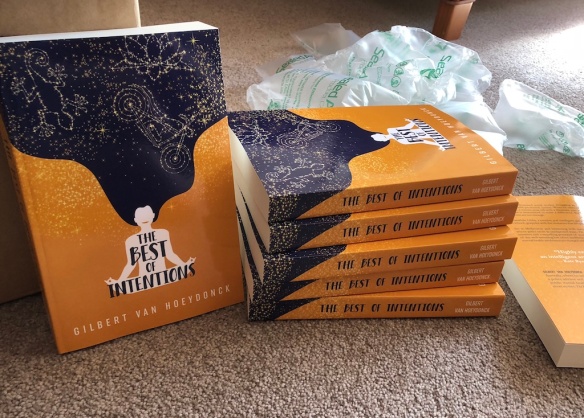
And look, I can make piles of them. And my wife comes home just before I start mentally composing a love letter to IngramSpark, my new print-on-demand and distribution heroes.
Forgive me, Dear Reader, the exuberant narcissism of this post. Let me assure you that my novel is free of navel gazing and instead explores social and mental health issues that affect many of us. I just thought that, after seven years of hard work, a little bit of curative bragging was in order… Thank you for your forbearance.
And please check out the homepage of my book for more details about its plot and availability.

My Debut Novel: The Best of Intentions
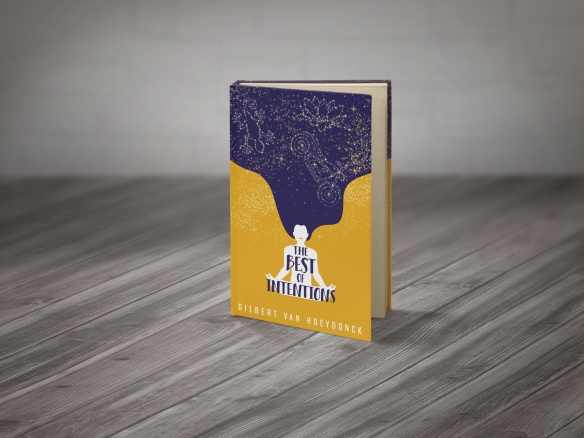 After seven years of plot development, writing and seemingly endless revisions, my debut novel is now available.
After seven years of plot development, writing and seemingly endless revisions, my debut novel is now available.
Writing a novel was so different from any writing I had done during my working life. With policy or report writing you generally have a good idea about the purpose and contents of your document, and its structure is pretty much determined by those parameters. Writing a novel means creating a world from scratch, without a roadmap, and populating it with credible and distinct characters who can keep the reader engaged. Exhilarating. Scary too.
Not surprising then, that timelines blew out. And while I’ve always felt comfortable about having my professional writing edited, it has been more confronting to have my creative writing critiqued. It felt more personal––I had more skin in the game.
Set in Melbourne in 2009, against the background of the Black Saturday bushfires, The Best of Intentions is a sensitive and compelling portrayal of young people at risk and of the well-meaning but often ineffective child protection and mental health professionals charged with their care.
At more than 400 pages, it’s a good long read that follows a range of memorable characters whose paths cross in unexpected ways. Here’s an excerpt from the blurb:
Kurt is a disillusioned case worker struggling in an under-resourced child protection system. When he takes on the case of Gecko, a sixteen-year-old with a traumatic past and a shaky future, he is determined to make a difference. But the best of intentions are not enough.
While my novel is a work of fiction, some of my views about systemic shortcomings in child protection and public mental health services have found their way into the text.
The focus on ‘case finding’ and throughput in child protection, at the expense of providing a meaningful service to kids placed in care. The unrealistically high case loads.
In mental health, the high threshold for accessing a service, the one-dimensional nature of the medical treatment model; and the failure to abolish mixed gender wards in Victoria, leaving vulnerable young women exposed to harassment or assault at a time that they need optimal support and safety.
Does not sound like escapist reading? It isn’t. I have taken pains, though, to ensure that The Best of Intentions works as a novel in the first place, as a gripping story that will keep readers engaged to the end. No one wants to read a manifesto.
“Highly engaging … an intelligent and moving novel.” Dr Kate Ryan, Writers Victoria
The Best of Intentions is available as an e-book and can be bought from major distributors, including Amazon Kindle, Apple Books, Barnes & Noble and Kobo. Check my novel’s homepage for purchase links.
You will soon also be able to order a paperback version (currently in production) from your local bookseller or from an online distributor.
the shadows cast by a falling child
 Back in 2011, when my novel was but an impulsive neuron playing Parkour across synapses somewhere in my brain, the title of my Magnum Opus was going to be The Bus Drivers. Shortly afterwards, that febrile neuron had to face the discipline board and its wiser elders settled upon Resilience as the working title for my book. The original title survives in the text as a little aside in a conversation––so you’ll be able to find out what I was thinking. Continue reading
Back in 2011, when my novel was but an impulsive neuron playing Parkour across synapses somewhere in my brain, the title of my Magnum Opus was going to be The Bus Drivers. Shortly afterwards, that febrile neuron had to face the discipline board and its wiser elders settled upon Resilience as the working title for my book. The original title survives in the text as a little aside in a conversation––so you’ll be able to find out what I was thinking. Continue reading
bait: what are the chances?

My latest short story, Bait, went live this week. It is the tale of three young men from Antwerp who set out on a camping trip to the Belgian Ardennes in the 1970s. When they arrive, the place is teeming with gendarmes (Belgian para-military police)…
Bait is not crime fiction but a portrait sketch of headstrong young men whose plans are thrown into disarray, with surprising ramifications. It is available only as an e-book; check my author website for links.
spitfire: a different kind of ghost writing

Gilbert Delcon with his sister Georgette, Bonheiden ca. 1951.
To name your child after another person means to set up a connection from birth. To name your child after a loved one who perished under dramatic circumstances raises the stakes considerably. I was such a child, named after an uncle who died in 1952, a year before I was born. All through my childhood, Uncle Gilbert stared back at me from framed photographs at my grandparents’ place. Standing in the Texas desert, sitting in the cockpit of his training aircraft – always with his kind, dimpled smile. As I grew up, the family resemblances became more pronounced. But unlike Dorian Gray’s, his picture stayed the same as my face developed wrinkles and grooves – a small price to pay for the privilege of ageing.
I knew the stories, of course. As a young boy in World War II, Gilbert refused to seek shelter when the air raid sirens went off over Bonheiden, a small village in Flanders. Much to his parents’ frustration, he ran outside to watch the Allied formations pass over on their way to Germany. He was enthralled with Spitfires in particular, captivated by the elegance of their design. One day, he resolved, he would be flying a Spitfire, and that would be the best day of his life. Continue reading
remembrance day
Aside
It is an anniversary of sorts: 102 years ago, on 10 September 1914, my great-grandfather, Aloïs Delcon, was killed in his pub in Haacht (Belgium) by marauding German troops. His 16-year-old son fled the scene in a hail of gunfire and collapsed in an asparagus field with a shoulder wound.
In Fate and Asparagus (Kindle version) I tell the story of that encounter and the events that ensued and cast a shadow over our family for years to come. See the Fate and Asparagus page of my blog for other versions.

secular prayer for dark times
Nations line up, bristling.
Everyday symbols imbued with treachery.
A new spring heralds years of destruction.
A sunflower field receives fallen angels.
Nine dashes mark isles of discord.
Lessons learned at great cost
forgotten or disregarded.
Oh, reckless race.
There is no wisdom in these times.
Young men in black
detonate themselves
in markets airports subways.
Young men in uniform
aim rockets bombs drones.
Hellfire. Predator.
From Gaza to the Hindu Kush,
from Dhaka to Dallas,
there is no love in these times.
We live in fear
and turn against our brothers.
Our lives diminished
as we point out the others.
Our priests are on trial,
and we are led by fools.
There is no path for these times.
Too many homes
imploded into rubble.
Too many children
washed up on the shore.
Too many on the roads
with fevered dreams,
garrotted by the past.
Too many futures foregone.
So let us read old books
of fantasy, love and caring,
of gardens moist with dew.
Let us rise against the black tide
of hatred and despair.
Let us build, create and heal.
That is the wisdom for these times.
Let us look into our hearts
and remove those scabs of fear.
Ungird your angry armour
lest you turn into what you fight.
There is more to unite us,
on our fragile blue planet,
than to place us apart.
That is the love for these times.
Let us link hands
with our brothers and sisters.
Show them our love,
listen to their pain,
share our bread.
For violence feeds off itself
until it is quenched by love.
That is the path for these times.
Start right now.
© Gilbert F. J. Van Hoeydonck
20 July 2016
fate and asparagus now available
 What happened to Aloïs Delcon, my great-grandfather, on 10 September 1914, when German troops overran the Belgian village of Haacht?
What happened to Aloïs Delcon, my great-grandfather, on 10 September 1914, when German troops overran the Belgian village of Haacht?
As I grew up, my grandfather’s wartime stories became darker and more complex. One day he told me a story he had never even told his wife.
Little did I know at the time that his tale would continue to dog me with surprising insistence, and that moving to the other side of the world would bring me closer to my family’s history in an unforeseen way…
coming soon: fate and asparagus
Gallery

This gallery contains 7 photos.
Running a pub can be tricky. You need to be the sociable type, good at defusing conflict. But what can you do when an entire army turns up on your doorstep, half drunk and looking for more? That is what … Continue reading
